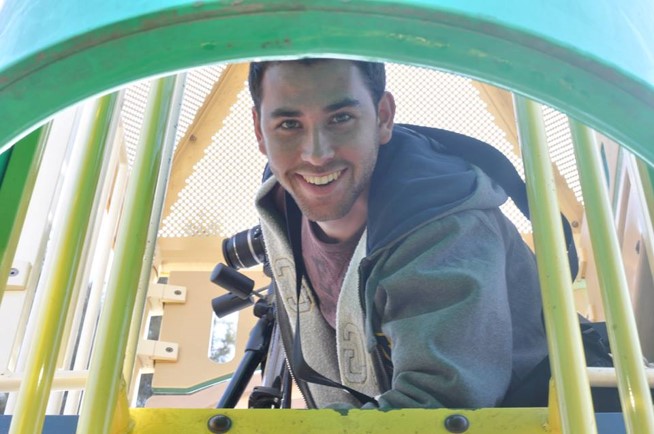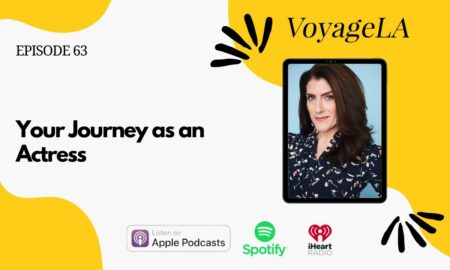

Today we’d like to introduce you to Jeremy Borison.
Thanks for sharing your story with us Jeremy. So, let’s start at the beginning and we can move on from there.
I was raised in an Orthodox Jewish community in Cleveland, Ohio, which made coming out as gay difficult. Homosexuality is taboo in the Orthodox world and many rabbis and Jewish organizations get pushback for simply talking about the subject. When I came to the realization about my own sexuality, I waited until leaving my hometown for college until I felt comfortable telling others.
I studied film production and directing in college, and always shied away from broaching my personal story in my art. But very slowly, both religion and sexuality began to creep into my films. At the same time, I was also becoming more active in Jewish LGBTQ organizations and in advocating change within the Orthodox Jewish world. I spoke in Orthodox communities about the struggles of being gay and partnered with organizations to create social and support groups for queer individuals from Orthodox backgrounds. It soon became clear to me that the best way to create social change was to integrate my work in the Orthodox LGBTQ world with my work in film.
“Boxes” was the first project to emerge from this realization. It’s a short film that follows a Holocaust survivor and her gay granddaughter, each of whom is hiding her own secrets and past. I wrote the script based on the actual experience of a friend who, after her grandmother passed away, discovered an unknown marriage certificate from before her grandmother had survived the Holocaust. Before we even began filming, I started to hear accounts of other LGBTQ grandchildren of Holocaust survivors with almost identical stories to the film. A year and a half later, we held a screening in Los Angeles with a panel of LGBTQ grandchildren in which we discussed those often conflicting identities, and the way that history of oppression is used to prevent queer individuals from coming out. The success and reception of “Boxes” led to the development of my next and current project, which focuses directly on the oppression of LGBTQ youth within the Orthodox Jewish community.
We’re always bombarded by how great it is to pursue your passion, etc – but we’ve spoken with enough people to know that it’s not always easy. Overall, would you say things have been easy for you?
The ups and downs of my work in film have in many ways mirrored the challenges and successes of my involvement in Orthodox LGBTQ inclusion. When I first moved to Los Angeles four years ago, there was no space for LGBTQ inclusion in Orthodoxy. It was over a year before I even met another queer individual in the area from a similar background. I am still religiously observant, so it was especially difficult to find any sort of community.
I started looking for ways to create a space for myself and other people with similar intersecting identities. I first worked with a national organization called Eshel to create programming. I was also fortunate to find an Orthodox synagogue that welcomed me and allowed me to speak about my experiences as someone LGBTQ. Eventually, I worked with the rabbinical staff to draft an LGBTQ inclusivity policy. Fast forward four years, and I now co-run monthly programming in Los Angeles for Orthodox LGBTQ individuals with the organization JQ International, and I’m surrounded by whole presence of queer-identifying individuals in the synagogue.
The “Boxes” screening and panel emerged from this Orthodox programming as a venue to discuss religious and LGBTQ intersectionality. The most exciting outcome of both the films and programming has been discovering other stories similar to my own and bringing those people together. It’s been extremely rewarding to combine my organizational efforts and my artistic work. And what better way to make change and reach an audience than through the medium of film.
However, the real setback is the scale of outreach. My work in film and in social organization is limited to those who attend screenings or events. It often becomes an issue of preaching to the choir, when we need to reach the communities that wouldn’t volunteer their time with us in the first place. That is one of the main goals of this next project in terms of scale and distribution- to create a film that brings light to LGBTQ voices in the Orthodox space but also draws attention beyond the LGBTQ Orthodox community.
So, as you know, we’re impressed with Jeremy Borison – tell our readers more, for example what you’re most proud of and what sets you apart from others.
There are many spaces where I can be religiously practicing and many other spaces that are LGBTQ inclusive, however, I have to work very hard to create spaces that are welcoming to both my religious faith and my sexual identity. Through my films, I’m able to do that both on screen and in practice. The stories are aspirational, but the follow up provides real-life discussions and repercussions.
While screening “Boxes” at various events and festivals, it became apparent that there is a lack of knowledge and understanding about LGBTQ persecution in general, but specifically in the Holocaust. I began to see a parallel between the way queer stories are forcefully hidden in the Orthodox world today and the way they were systematically hidden during and after the Nazi regime. Once again I find myself using film to create a space in which these identities can be addressed, discussed, and welcomed.
What were you like growing up? Personality wise, interest wise, etc.
I’ve been drawn to art for as long as I can remember. I participated in community theater starting in elementary school, played piano for thirteen years, and was consistently enrolling in art classes and eventually film courses. I used to watch movies and then go through the entire home video content of Behind-the-scenes and interviews. All the while, I was going to an Orthodox Jewish day school where I had a double curriculum of secular studies and Judaic studies until 5 pm every day.
There are two very specific film-related memories I have. The first was in middle school, while I was reading Agatha Christie’s And Then There Were None for a school project. I approached the very climactic finale of the book and thought to myself, ‘I know how this would be shot as a movie.’ It was the first time I thought of myself as a potential filmmaker. The second memory was when I saw the film ‘Trembling Before G-d.” It’s a documentary from 2001 that opened the discussion of LGBTQ individuals in the Orthodox community and was, needless to say, widely controversial. The film caused me to come to terms with my own identities and realize the social impact that could result from a story on screen.
Contact Info:
- Website: www.jeremyborison.com
- Email: borisonj@gmail.com
- Facebook: https://www.facebook.com/Boxes-Short-Film-267272837012344/?ref=bookmarks
- Other: www.boxesshortfilm.com





Getting in touch: VoyageLA is built on recommendations from the community; it’s how we uncover hidden gems, so if you know someone who deserves recognition please let us know here.



















